
Professor Ludwig Von Drake is a cartoon character created in 1961 by The Walt Disney Company. He is the paternal uncle of Donald Duck. He was first introduced as the presenter in the cartoon An Adventure in Color, part of the first episode of Walt Disney's Wonderful World of Color on NBC. According to the episode The Hunting Instinct of that series he and Donald Duck's father are brothers. He is described as a scientist, lecturer, psychologist, and world traveler. The character displayed his "expert" knowledge on a variety of subjects in eighteen episodes of the classic anthology series, as well as on a number of Disneyland Records.
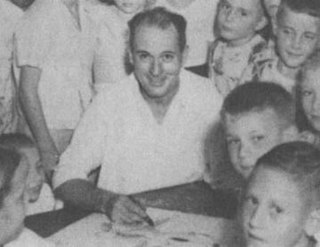
Charles Alfred "Al" Taliaferro, was an American Disney comics artist who produced Disney comic strips for King Features Syndicate. Taliaferro is best known for his work on the Donald Duck comic strip. Many of his strips were written by Bob Karp.

Uncle Scrooge is a Disney comic book series starring Scrooge McDuck, his nephew Donald Duck, and grandnephews Huey, Dewey, and Louie, and revolving around their adventures in Duckburg and around the world. It was first published in Four Color Comics #386, as a spin-off of the popular Donald Duck series and is still presently ongoing. It has been produced under the aegis of several different publishers, including Western Publishing, Gladstone Publishing, Disney Comics, Gemstone Publishing, Boom! Studios, and IDW Publishing, and has undergone several hiatuses of varying length. Despite this, it has maintained the same numbering scheme throughout its six decade history, with only IDW adding a secondary numbering that started at #1.
Disney Comics is currently a label of Disney Publishing Worldwide and was a comic book publishing company operated by The Walt Disney Company from 1990 to 1993. It was connected with W. D. Publications, Inc., which was a subsidiary of The Walt Disney Company that published Disney comics during that time span. W. D. Publications, Inc. created Disney Comics in 1990 so that The Walt Disney Company would not have to rely on outside publishers such as Gladstone Publishing. In the US, Disney only licensed Disney comic books to other publishers prior to 1990.
Disney comics are comic books and comic strips featuring characters created by the Walt Disney Company, including Mickey Mouse, Donald Duck and Scrooge McDuck.
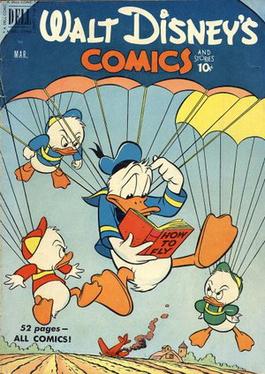
Walt Disney's Comics and Stories, sometimes abbreviated WDC&S, is an American anthology comic book series featuring characters from The Walt Disney Company's films and shorts, including Donald Duck, Scrooge McDuck, Mickey Mouse, Chip 'n Dale, Li'l Bad Wolf, Scamp, Bucky Bug, Grandma Duck, Brer Rabbit, Winnie the Pooh, and others. With more than 700 issues, Walt Disney's Comics & Stories is the longest-running Disney comic book in the United States, making it the flagship title, and is one of the best-selling comic books of all time.
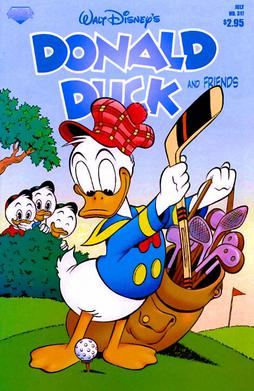
Donald Duck, also known as Donald Duck and Friends, is an American Disney comic book series starring the character Donald Duck and published by various publishers from October 1942 to June 2017. As with many early Disney comics titles, Donald Duck began as individual issues of Dell Comics' Four Color one-shots series. It was published as its own regular series in November 1952, starting with issue #26.
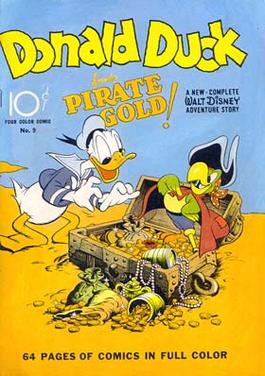
Four Color, also known as Four Color Comics and Dell Four Color, is an American comic book anthology series published by Dell Comics between 1939 and 1962. The title is a reference to the four basic colors used when printing comic books. The first 25 issues (1939–1942) are known as "series 1". In mid-1942, the numbering started over again, and "series 2" began. After the first hundred issues of the second series, Dell stopped putting the "Four Color Comics" designation on the books, but they continued the numbering system for twenty years.

Jungle Jim is the fictional hero of a series of jungle adventures in various media. The series began on January 7, 1934, as an American newspaper comic strip chronicling the adventures of Asia-based hunter Jim Bradley, who was nicknamed Jungle Jim. The character also trekked through radio, film, comic book and television adaptations. Notable was a series of films and television episodes in which Johnny Weissmuller portrayed the safari-suit wearing character, after hanging up his Tarzan loincloth. The strip concluded on August 8, 1954.
Scamp is a canine Disney comics character, the son of Lady and Tramp, all of whom appear in the 1955 animated film Lady and the Tramp. Scamp is featured in comic strips and comic books of his own since the 1950s. In the final scene of the film, the dogs have a litter of puppies, including three girl pups who look like Lady, and a mischievous, restless boy pup who resembles Tramp. The puppies are unnamed in the film and only appear in one scene, but the little boy puppy made an impression, and King Features Syndicate launched a comic strip a few months after the film's release.

Kalle Anka & C:o is a Swedish weekly Disney comics magazine, published by Egmont. The 52-page comic, launched in September 1948, is the overall best-selling Swedish comic magazine. In the early years, the comic printed translated stories from the United States, including Walt Disney's Comics and Stories, Four Color and other Dell Comics Disney titles. As Disney comics production waned in the United States in the 1960s, Kalle Anka began printing more European-produced content, from Scandinavia and Italy. Now, Kalle Anka & C:o and its Scandinavian sister editions Anders And & Co. (Denmark) and Donald Duck & Co (Norway) are identical, apart from the language.
Topolino is an Italian digest-sized comic series featuring Disney comics. The series has had a long running history, first appearing in 1932 as a comics magazine. Since 2013, it has been published by Panini Comics.

The Uncensored Mouse is a 1989 comic book series published by Malibu Graphics' Eternity Comics line. The series reprinted Mickey Mouse comic strip stories from 1930, including the first two sequences, "Lost on a Desert Island" and "Mickey Mouse in Death Valley". Only two issues were published. While these early sequences had been reprinted in Italy in the 1970s, The Uncensored Mouse was the first English-language reprint since the strip's newspaper run.
Le Journal de Mickey is a weekly French comics magazine established in 1934, featuring Disney comics from France and around the world. The magazine is currently published by Unique Heritage Media. It is centered on the adventures of Mickey Mouse and other Disney characters but also contains other comics. Le Journal de Mickey is credited with "the birth of the modern bande dessinée". It is now the most popular French weekly magazine for children between 8 and 13 years old.
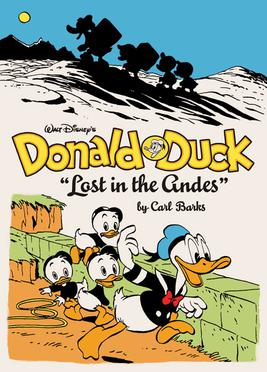
The Complete Carl Barks Disney Library is a series of books collecting all of the comic book Donald Duck and Uncle Scrooge stories written and drawn by Carl Barks, originally published between 1942 and Barks' retirement in June 1966. The series was launched in late 2011, and will comprise 6,000 plus pages over roughly 30 200- to 240-page volumes when it is finished.

DuckTales is an American animated television series, developed by Matt Youngberg and Francisco Angones, and produced by Disney Television Animation. The series is a reboot of the original 1987 series of the same name, itself an adaptation of Uncle Scrooge and other Duck universe comic books created by Carl Barks, which focused on the lives of Scrooge McDuck and his family as they engaged in a variety of adventures around the world, as well as in the fictional city of Duckburg. The reboot itself focuses on newer elements and deeper character stories, including a greater involvement of Donald Duck.

Micky Maus is a German comics magazine containing Disney comics. It has been published since 1951 by Egmont Ehapa.
Donald Duck is an American comic strip by the Walt Disney Company starring Donald Duck, distributed by King Features Syndicate. The first daily Donald Duck strip debuted in American newspapers on February 7, 1938. On December 10, 1939, the strip expanded to a Sunday page as well. Writer Bob Karp and artist Al Taliaferro worked together on the strip for more than 30 years. The strip ended in May 1995.
Silly Symphony is a weekly Disney comic strip that debuted on January 10, 1932, as a topper for the Mickey Mouse strip's Sunday page. The strip featured adaptations of Walt Disney's popular short film series, Silly Symphony, which released 75 cartoons from 1929 to 1939, as well as other cartoons and animated films. The comic strip outlived its parent series by six years, ending on October 7, 1945.











